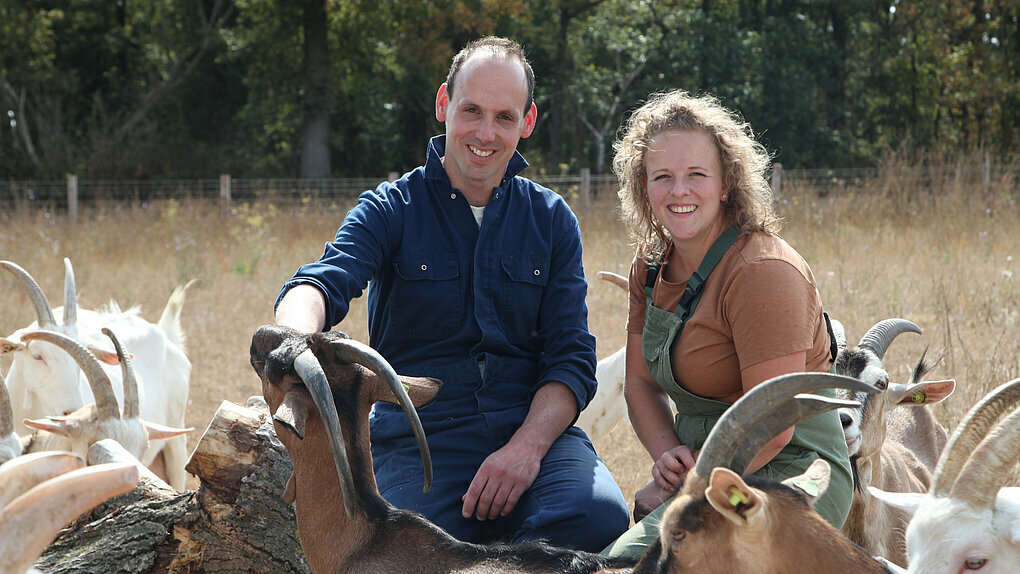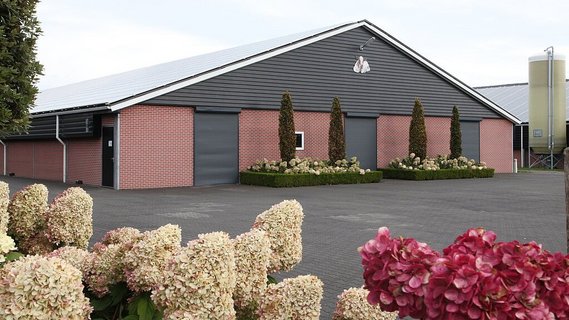In the Maasduinen National Park in North Limburg, just a stone’s throw from the German border, Roy Maar (32) and Lisanne van de Mast (29) own a small-scale goat company and farm shop called Geitengeluk. In this peaceful, expansive region, these young entrepreneurs bought a poultry barn with two hectares of grassland in 2018. The environmental permit was updated to allow for 200 dairy goats and 180 kids. ‘We were able to get started fairly quickly,’ says Roy. ‘The barn was already in good condition and well insulated. All we did was install fencing, put down straw and invest in fluorescent lighting and a milking stand so we could milk our goats.’
Currently, Roy and Lisanne milk 45 goats that are kept outdoors as much as possible. In the kidding season, from January to February, they’ll add another 30 to that. However, growth is not one of their company objectives. Their small-scale, optimal value creation and in-house marketing are the secrets to this company’s success. In addition, they take animal welfare very seriously. ‘We score highly in this respect,’ says Roy. ‘For example, we never dehorn the dairy goats and leave the bucks in the group with their mothers for the first few months. In fact, the bucks remain on the site for seven months. This is unique in our sector and is the main benefit of having a smaller company like ours. We might not be organic, but in terms of welfare, we want to be ahead of the pack.’
Everything in-house
The major advantage of having a smaller business is that Roy and Lisanne can do almost everything themselves: goat management, cleaning, processing, marketing, transport, sales and so on. As a result, their farm has an impactful and authentic story. ‘It is perhaps a little romanticised but people really appreciate that the farmer is involved in the product from start to finish.’
Roy and Lisanne sell both the dairy and meat from their animals in their farm shop. Every bit of the animals is used and not a single drop of milk is sent to a factory. ‘We produce 36,000 litres of goat milk per year and that all goes into the production of fresh dairy products,’ says Roy. ‘We have cheese-making facilities and every day the milk is sent to the curdling vat/cooling tank where we can chill milk down to 3°C. With this milk, we make yoghurt, quark, spreadable cheese, strained yoghurt and hard cheeses and we can even make custom products.’ Even the whey that is produced as a by-product is utilised. ‘We use this whey to feed our pigs that roam outdoors 24/7. The meat from these animals is then sold in our shop. We produce around ten pigs per year.’
Our company is small yet financially interesting because we use the whole animal and do a lot in-house
Roy Maar
The same goes for the meat from the bucks that spend extra time with their mothers and only leave the site after seven months. Roy: ‘The bucks are slaughtered in the region and processed by our local butcher. From the meat, he makes products such as sate, carbonade flamande and dry sausages.’ Roy and Lisanne pick up these products and vacuum pack them themselves.
Another strength of Roy and Lisanne’s approach is that they try to be as self-reliant as possible. They feed their goats primarily with grass, which they can grow on three-quarters of their own land. ‘Sometimes we come up short and buy grass from our neighbours, but we’re working on leasing extra land from the municipality.’ This ration is supplemented with a small amount of concentrate: 900 grams per goat per day. ‘We also make sure to look into the origin of this feed. The concentrate is produced in Europe and is non-GMO.’ Roy and Lisanne buy their straw from an organic farmer located just across the border, as well as a contractor in conventional farming.
Several sales channels and spreading of risk
Roy and Lisanne are young entrepreneurs with a passion for their trade. Every Saturday, they sell the dairy and meat from their own goats directly to the public. One of them works in the farm shop and the other mans a stall at the local market. ‘We’re proud of our products and we want to share that with the public,’ says Roy. These entrepreneurs know how to diversify their opportunities. In addition to the farm shop and markets, they also sell through their online shop, other farm shops, and enter into partnerships with restaurants and other establishments in the local area. Their products can already be found on several menus in the region. ‘Our company is small yet financially interesting because we use the whole animal and do a lot in-house,’ says Roy.
These young entrepreneurs also like to take the time to show people around the farm by giving tours and holding tastings. ‘These activities take time but we find it important to show people what we do. This is a wonderful sector and it’s just a shame that Q fever generates so much attention.’
Roy and Lisanne see that people appreciate goat farming and the decisions they have made within their business. For example, they notice that people respond positively to the fact that they keep the bucks on the farm. ‘When you can get people interested in your story, it gives you a real boost,’ says Roy. ‘These interactions also allow us to learn and become more conscious.’ He explains that some customers were concerned about the use of plastic packaging. ‘So we stopped using plastic and switched to glass instead.’


![[Translate to English:] [Translate to English:]](/fileadmin/_processed_/6/2/csm_Ontwerp_zonder_titel__10__13eb691ba8.png)
![[Translate to English:] [Translate to English:]](/fileadmin/_processed_/8/c/csm_Peter_Vogel_3071ec9c7a.png)